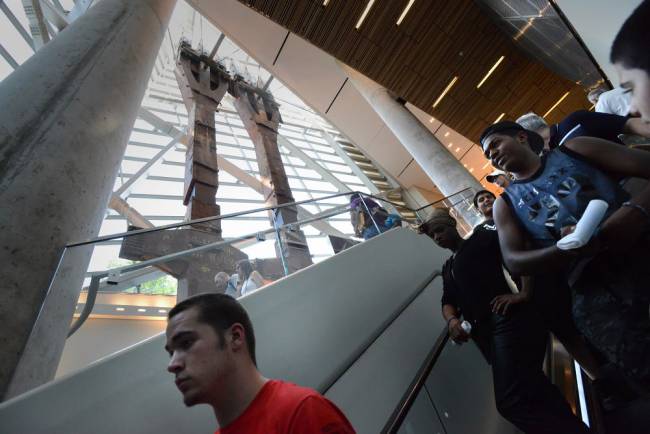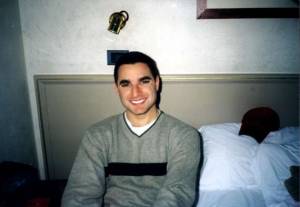Nicholas Pugliese The Record
NEW YORK — Todd Ouida was working for financial services firm Cantor Fitzgerald on the 105th floor of the World Trade Center’s North Tower when a Boeing 767 slammed into his building on September 11, 2001. Having overcome a bout of crippling childhood anxiety only to thrive in high school and college, Todd used his final moments to call his mother to tell her that his father, Herb, who worked 28 floors below, was OK.

Alex (left) and others in the group ride the escalator to the lower level of the museum. They pass two huge steel beams from the World Trade Center. Carmine Galasso, The Record
“Here was a kid who suffered from the deepest fears, now in the most dangerous situation of all,” Herb would later say, “and he reached out to take fear away from his mom,”
As a tour guide shared this story and others like it in the plaza outside the 9/11 Memorial on Tuesday morning, something seemed to click for the half-dozen teenagers gathered there who had made the trip from Passaic County to Lower Manhattan. Part of a group from Youth Consultation Services, a statewide organization that provides behavioral and mental health services to children and young adults, the teenagers were finding hope in the midst of tragedy and drawing comparisons to their own lives.
“I’ve been through a lot, seen my brothers go to jail, gone to a group house myself,” said John, 15, whose last name has been withheld to protect his privacy. “I could relate with some of the people here because they’ve been through a lot and they went through a lot of pains, but they still stood their head up.”
Alex, 18, said of Todd and his father, “It seems like they were really close, and me and my dad are really, really close, so that’s what makes the story a lot more inspiring.” Like Todd, he said, “I’ve overcome a lot of stuff,” but rather than work in financial services, “I actually want to be a drug counselor.”
Unknown to the teenagers until the end of their tour, the visit to the 9/11 Memorial was sponsored by the Todd Ouida Children’s Foundation, a River Edge-based organization started by Herb Ouida, now 73, and his wife, Andrea, in the wake of their son’s death. Aimed at taking the stigma out of mental illness by financing research and programs to treat it, the foundation has donated more than $1.5 million to roughly two dozen aligned charities to date.
Tuesday’s tour started with a stroll around a pair of outdoor reflecting pools that feature the names of all 2,983 [sic – 2,973] victims — 658 of whom worked at Cantor Fitzgerald. The group then descended 70 feet below street level to the foundation of the former World Trade Center, where they examined mangled steel beams, a battered antenna tower and the disfigured carcass of an FDNY fire truck — dramatic evidence of a violent and chaotic day that most of the teenagers are too young to remember.
As the tour proceeded, the young people tried to reconcile the destruction with the various examples of heroism on display.
“A lot of people helped out and gave their lives for other people,” Alex said.
“I’m inspired, I’m sad a little bit, I feel like I’m about to cry,” added Irvin, 14.
Tuesday’s outing to the memorial was the first sponsored by the foundation and, if deemed a success by those involved, may expand into a regular program offered in the summer months. A second tour for a group from Children’s Aid and Family Services in Bergen County is scheduled for Aug. 28.
Neither Herb nor Andrea joined the tour Tuesday — they have not visited the reflecting pools nor the museum since they opened in 2011 and 2014, respectively — but Herb said in an interview last week that he hoped that his son’s story would help the teenagers discuss what they were experiencing, be it mental illness or other challenges.
“How do we reach children who are having difficulties?” he said. “We can talk about how Todd overcame difficulty as a child and use that story to help overcome what they are facing.
“It’s not a straight path; it’s not a simple thing,” he added. “There’s recovery and relapse, recovery and relapse. And then there’s full recovery.”


